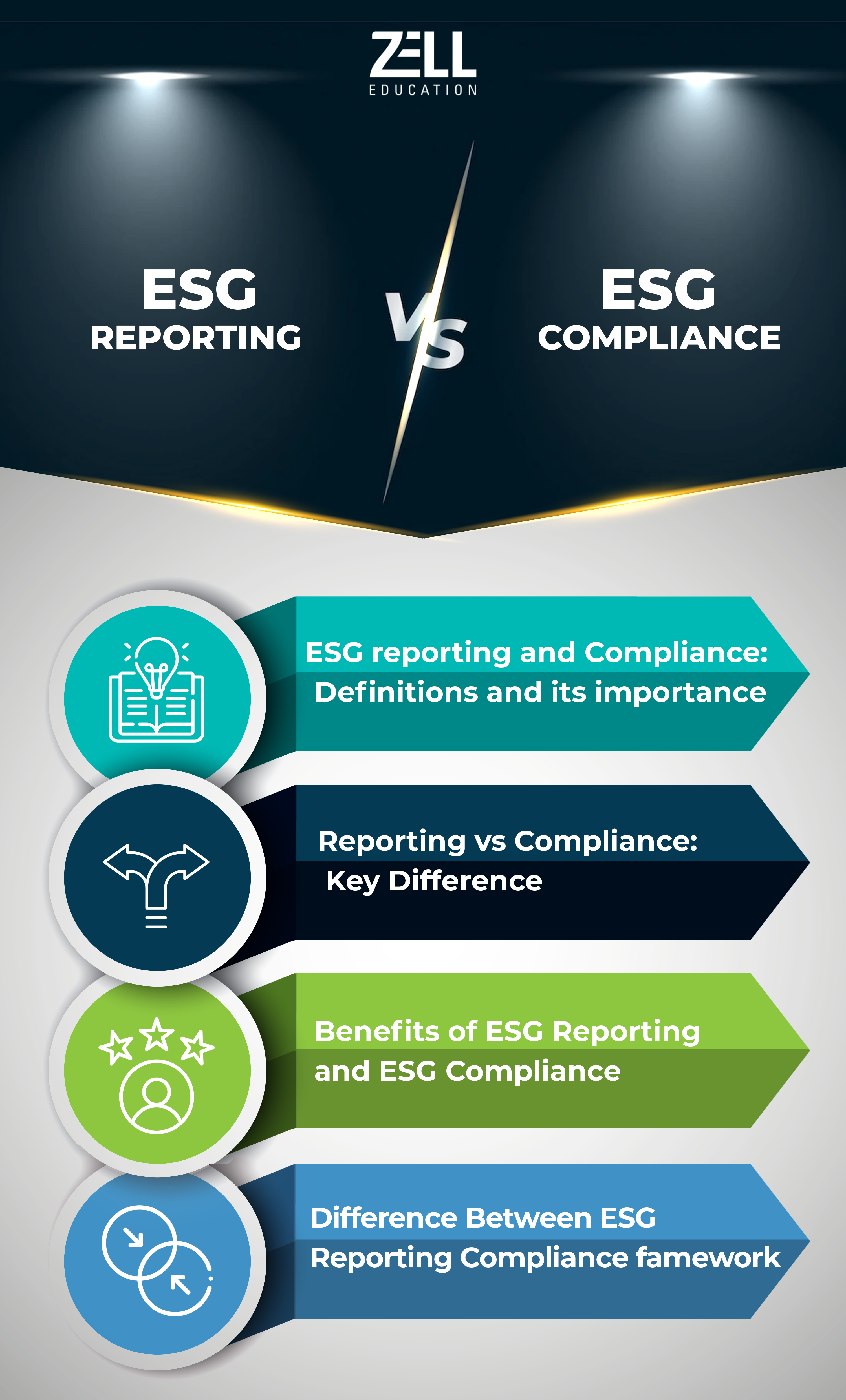ESG (Environmental, Social, and Governance) practices are integrated into a company’s operations to ensure sustainability and social responsibility. ESG reporting and compliance are integral components of this process. While both are essential, they serve different purposes and involve different practices. Let’s explore the definitions, importance, and differences between ESG reporting vs. ESG compliance, as well as their respective frameworks.
ESG Reporting and Compliance: Definitions and Their Importance
1. ESG Reporting
ESG reporting is the process of publicly disclosing a company’s environmental, social, and governance practices as a part of the societal right to information. This reporting provides transparency and accountability to industry stakeholders, including investors, shareholders, customers, and employees. ESG reporting frameworks include the Global Reporting Initiative (GRI) and the Sustainability Accounting Standards Board (SASB), among others.
2. ESG Compliance
ESG compliance is the practice of implementing ESG standards and regulations within the industrial framework of a company’s business operations. Compliance frameworks include the United Nations Global Compact and the ISO 14001 Environmental Management System standard. ESG compliance aligns a company’s ESG practices with established standards and regulations.
Both ESG reporting and compliance make it mandatory for a company to adopt sustainable practices.
Reporting vs Compliance: Key Differences
Reporting and compliance differ in several ways, including the following:
| REPORTING | COMPLIANCE |
| Voluntary | Mandatory |
| Involves public disclosure | Involves regulatory compliance |
| Has qualitative metrics like social impact | Has quantitative metrics like emissions reduction targets. |
Benefits of ESG Reporting and ESG Compliance
Adopting ESG reporting and compliance practices is beneficial in many ways —
- Establishes clear communication with stakeholders through transparent and credible public disclosure of their company’s ESG practices.
- Enhances the business’s reputation maintenance and management.
- Creates long-term value through spatial visualisation. The company adopts sustainable business practices to increase performance efficiency and reduce operational costs.
- Curating a community bonded over the common cause of sustainability and social responsibility.
Difference Between ESG Reporting Compliance Framework
| ASPECT | ESG REPORTING | COMPLIANCE FRAMEWORK |
| Purpose | ESG provides transparency on ESG performance, initiatives, and impacts | Compliance Framework ensures adherence to environmental, social, and governance standards and regulations |
| Focus | ESG mainly highlights environmental, social, and governance factors | The Compliance Framework emphasizes compliance with specific laws, regulations, and standards |
| Audience | Stakeholders of ESG include investors, customers, employees, and regulators | Internal and external stakeholders, regulatory bodies, and industry tycoons |
| Content | ESG includes data, metrics, narratives, and analysis of ESG factors | Compliance Framework involves policies, procedures, risk assessments, and regulatory filings |
| Frequency | ESG can be periodic (annual or quarterly) or ad hoc | Ongoing, with regular monitoring, auditing, and reporting |
| Third-party Involvement | It may involve third-party verification, ratings, or assurance | Third-party audits, certifications, or assessments are common in Compliance Framework |
Conclusion
ESG reporting and compliance serve distinct objectives but complement each other and work towards the same goal: a monetarily viable and socially responsible business. While ESG reporting and compliance are important aspects of every companies sustainability measures, developing and implementing ESG reporting results gives our businesses numerous benefits and help building a more sustainable society.
FAQ
What is ESG compliance?
ESG compliance refers to how closely a firm commits to environmental, social and governance standards and regulations. It involves ensuring that a company’s operations and activities align with applicable rules, industry standards and best measures for sustainability, social responsibility and ethical considerations.
What is ESG reporting?
ESG reporting involves revealing data and statements of a company’s environmental, social and governance performance. It gives stakeholders such as investors, consumers, workers, employees and regulators an understanding and view of a company’s sustainability measures, influences and objectives. ESG reporting often comprises data, measurement, and explanation regarding different EAG factors and the way they are managed inside an organization.
What are the criteria for ESG compliance?
The criteria and requirements for ESG compliance differ based on industry, region and specific ESG standards or structures that are used by a corporation. However, common ESG compliance requirements involve following Environmental standards, implementing socially responsible activities, and maintenance of effective governance systems. Criteria may also involve particular metrics, targets and reporting requirements for the performance of ESG.
What are the different types of ESG reporting?
ESG reporting is classified into various types, which consist of :
1) Sustainability reports: Detailed and analysed reports that explain a company’s sustainability performance, strategies and influences in environmental, social and governance sectors.
2) Combined reports: Reports that incorporate both financial and non-financial data and statements to present a comprehensive picture of a company’s performance, including ESG factors.
3) ESG Disclosure: Specific disclosure of relevant ESG information, which is frequently incorporated in financial reports and statements, regulatory filings or specialized ESG reports.
4) ESG ratings and ranking: Independent parties rating agencies or index providers publish reports or rankings that evaluate a company’s ESG performance as compared to peers or industry standards.
5) Stakeholders involvement: Reports that describe contacts and interaction with stakeholders, including engagement measures, feedback and actions taken in response to stakeholders’ concerns.

